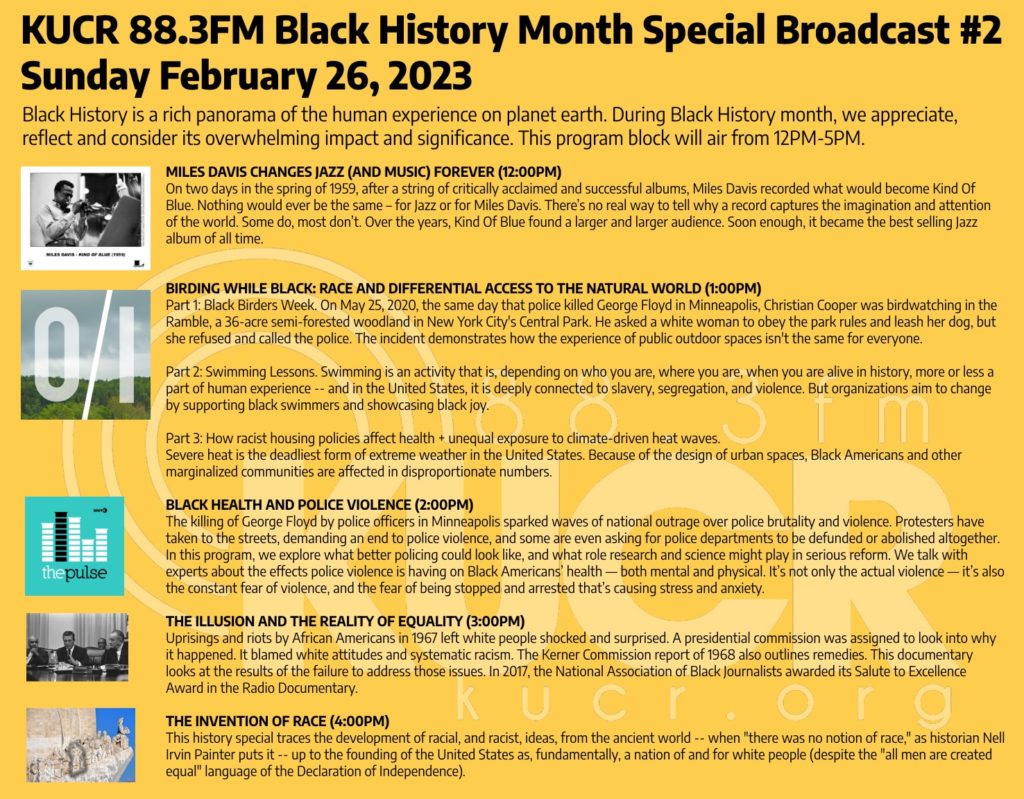KUCR Black History Month Special Broadcast #2

Black History is a rich panorama of the human experience on planet earth. During Black History month, we appreciate, reflect and consider its overwhelming impact and significance. This program block will air from 12PM-5PM.
MILES DAVIS CHANGES JAZZ (AND MUSIC) FOREVER (12:00PM)
On two days in the spring of 1959, after a string of critically acclaimed and successful albums, Miles Davis recorded what would become Kind Of Blue. Nothing would ever be the same – for Jazz or for Miles Davis. There’s no real way to tell why a record captures the imagination and attention of the world. Some do, most don’t. Over the years, Kind Of Blue found a larger and larger audience. Soon enough, it became the best selling Jazz album of all time.
BIRDING WHILE BLACK: RACE AND DIFFERENTIAL ACCESS TO THE NATURAL WORLD (1:00PM)
Part 1: Black Birders Week. On May 25, 2020, the same day that police killed George Floyd in Minneapolis, Christian Cooper was birdwatching in the Ramble, a 36-acre semi-forested woodland in New York City’s Central Park. He asked a white woman to obey the park rules and leash her dog, but she refused and called the police. The incident demonstrates how the experience of public outdoor spaces isn’t the same for everyone.
Part 2: Swimming Lessons. Swimming is an activity that is, depending on who you are, where you are, when you are alive in history, more or less a part of human experience — and in the United States, it is deeply connected to slavery, segregation, and violence. But organizations aim to change by supporting black swimmers and showcasing black joy.
Part 3: How racist housing policies affect health + unequal exposure to climate-driven heat waves.
Severe heat is the deadliest form of extreme weather in the United States. Because of the design of urban spaces, Black Americans and other marginalized communities are affected in disproportionate numbers.
BLACK HEALTH AND POLICE VIOLENCE (2:00PM)
The killing of George Floyd by police officers in Minneapolis sparked waves of national outrage over police brutality and violence. Protesters have taken to the streets, demanding an end to police violence, and some are even asking for police departments to be defunded or abolished altogether. In this program, we explore what better policing could look like, and what role research and science might play in serious reform. We talk with experts about the effects police violence is having on Black Americans’ health — both mental and physical. It’s not only the actual violence — it’s also the constant fear of violence, and the fear of being stopped and arrested that’s causing stress and anxiety.
THE ILLUSION AND THE REALITY OF EQUALITY (3:00PM)
Uprisings and riots by African Americans in 1967 left white people shocked and surprised. A presidential commission was assigned to look into why it happened. It blamed white attitudes and systematic racism. The Kerner Commission report of 1968 also outlines remedies. This documentary looks at the results of the failure to address those issues. In 2017, the National Association of Black Journalists awarded its Salute to Excellence Award in the Radio Documentary.
THE INVENTION OF RACE (4:00PM)
This history special traces the development of racial, and racist, ideas, from the ancient world — when “there was no notion of race,” as historian Nell Irvin Painter puts it — up to the founding of the United States as, fundamentally, a nation of and for white people (despite the “all men are created equal” language of the Declaration of Independence).



No Comments, Comment or Ping